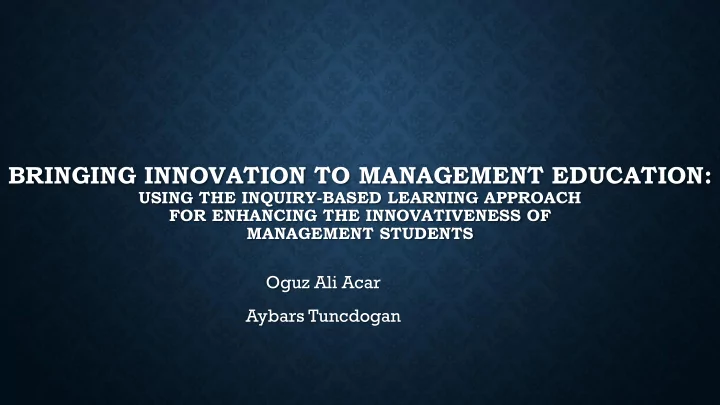

BRINGING INNOVATION TO MANAGEMENT EDUCATION: USING THE INQUIRY-BASED LEARNING APPROACH FOR ENHANCING THE INNOVATIVENESS OF MANAGEMENT STUDENTS Oguz Ali Acar Aybars Tuncdogan
EXTERNAL DEMANDS FOR MORE INNOVATION (I.E. THRIVING THROUGH TURBULENT TIMES) “Innovation is the lifeblood of any organization … without it, not only is there no growth, but, inevitably, a slow death.“ – Ed Sheelan Innovation critical for success, growth and survival of companies PWC survey: 83% of executives consider innovation ‘important’ or ‘very important’, and expect it to become even more important in the following years Indeed, environmental dynamism and complexity levels are always rising (e.g., IBM CEO study), and such external demands require more innovation to keep up (e.g., Jansen, van den Bosch & Volberda, 2006)
DEMAND FOR INNOVATIVE MANAGERS AND EMPLOYEES (I.E. DEVELOPING THE SOCIAL CAPITAL TO THRIVE THROUGH TURBULENT TIMES) In line with these external demands, corporations are constantly seeking individuals that can bring innovation to the workplace Part of this effort is designing careful selection mechanisms (this gets quite a bit of attention) Another part of this effort is how we can design the physical, contextual and psychological architecture of the firm in order to emphasize innovation (also gets quite a bit of attention) The third part of this effort has to be developing this social capital during business education (gets much less attention so far)
INNOVATION IN MANAGEMENT EDUCATION Despite a broad agreement on the importance of innovation, the pedagogical approaches and learning tools that can enhance individual innovativeness are often neglected in management education. Management education tends to insufficiently emphasize the generation of new ideas at the expense of an emphasis on generalization from specific instances and prediction of consequences of certain actions (e.g., Dunne & Martin, 2006) HE criticized for killing ideas and capabilities of innovative students (Doss, 2015) “Learning environments that encourage the development of creativity and innovation together with business acumen are rare” – Quality Assurance Agency for Higher Education (QAA)
BRINGING INNOVATION TO MANAGEMENT EDUCATION It is our job, as the management educators, to develop for firms the social capital that has the ability to innovate Therefore, there is a need to better understand the pedagogical methods we can employ to enhance the innovativeness of students. This paper takes an initial step: 1. Examines one potentially useful approach (inquiry-based learning) 2. Two teacher-controlled moderator variables
INQUIRY-BASED LEARNING
INQUIRY-BASED LEARNING
INQUIRY-BASED LEARNING (IBL) Main ingredients of IBL are student-centricity, self-directedness and emphasis on active learning (Spronken ‐ Smith & • Walker, 2010) • Innovation requires independent and original thinking, sense of autonomy, and personal initiation Learning process of IBL has strong similarities to the process of generating an innovation • Learning process in IBL is driven by inquiry – problems and questions (Levy & Petrulis, 2012) which has close resemblance to • the innovation process which is often triggered by recognition of a problem or an opportunity (Kanter, 1988). Not only the driver of the inquiry process, but also activities undertaken to solve a problem is similar in the learning • environment of IBL and the real innovation projects in the businesses. Both of them deeply rely on the exploration of information from diverse sources, generation of multiple ideas to solve the problems, and effective communication of the solution.
IBL AND STUDENT INNOVATIVENESS • Proposition 1: Students who are exposed to the inquiry-based learning approach are relatively more likely to engage in innovative behaviors than those who are only exposed to conventional teaching approaches. That is, inquiry-based learning approach is likely to be positively associated with student innovativeness.
MODERATOR VARIABLES (MODE OF INQUIRY) • IBL can take a variety of forms and the implications of different forms with respect to student innovativeness vary • Multiple dimensions • One key dimension is level of independence (ranging from structured-inquiry to guided-inquiry to open-inquiry)
MODES OF INQUIRY Proposition 2: The mode of inquiry moderates the relationship between inquiry-based learning and student innovativeness such that an open inquiry strengthens the relationship between inquiry based- learning and student innovativeness.
MODERATOR VARIABLES (TEAM-BASED METHODS) • Main benefit of individual inquiry is that it ensures the student is engaged in all processes of the inquiry, however: 1. Does not reflect the reality of the workplace 2. Individuals are limited to their own sets of information and abilities to synthesize • Team-based inquiry provides the usual benefits of diversity, e.g., exposure to new perspectives, bringing people of different abilities together, learning from each other • We hypothesize that the individuals who got used to engaging in team-based inquiry during their management education programs will be better at doing so also at their workplaces • Proposition 3: The mode of inquiry moderates the relationship between inquiry-based learning and student innovativeness such that a discovery-focused inquiry strengthens the relationship between inquiry based-learning and student innovativeness.
CONTRIBUTIONS 1. We conceptually explore a specific learning outcome that is acknowledged to be very important both in the management education literature as well as in the wider management literature, and propose a teaching method that can provide the means to reach this outcome. • Moreover, we discuss different modes of IBL as well as team-based learning approach as moderators of this relationship, which can further amplify the effect of inquiry-based learning on student innovativeness. 2. We contribute to the IBL literature: Knowledge regarding the use of IBL for management education is scarce, and we propose a new use of IBL in this area
FUTURE RESEARCH DIRECTIONS There are some key issues we have to resolve for this stream of research to successfully grow: 1. Empirical testing (maybe none of this works, or maybe the effects are only temporary?) 2. Evaluation Procedures (how do we evaluate ‘increased innovativeness’?) 3. Critical Factors Affecting Student Learning Experience (which factors affect IBL success?)
Recommend
More recommend